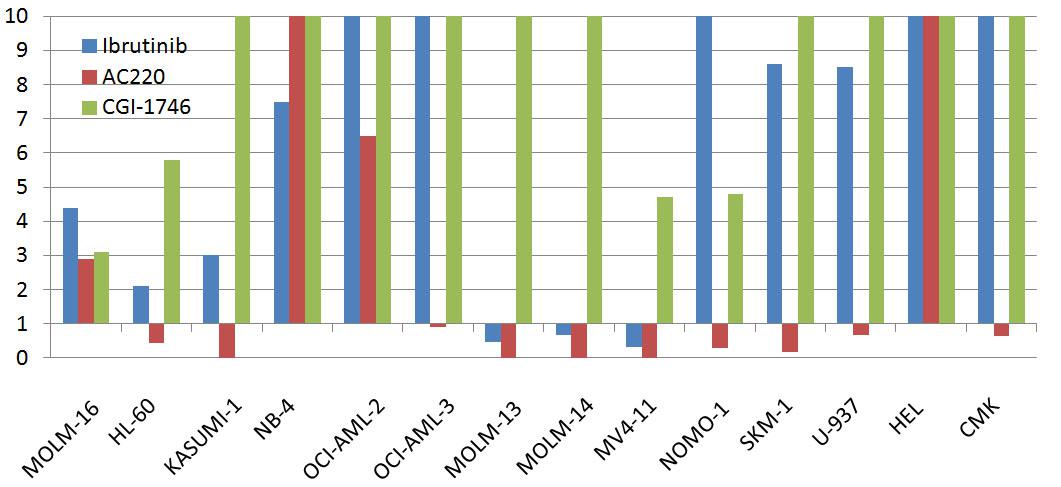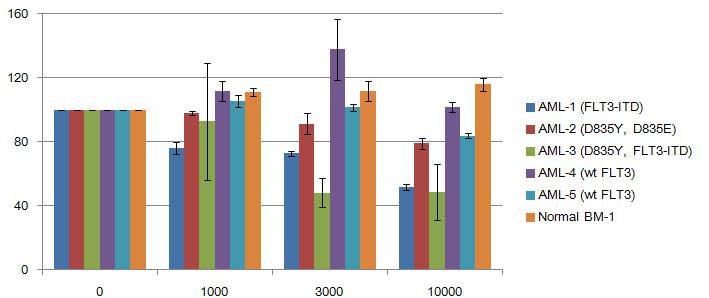Acute Myeloid Leukemia (AML) is a cancer of myeloid line of blood cells, characterized by rapid growth of abnormal white blood cells that accumulate in bone marrow and prevent the production of normal blood cells. AML is a kind of acute leukemia which commonly occurs in adults and the prevalence rate increases with age. Demand for effective medical treatment of AML remains serious. Besides standard chemotherapy, there is no targeted therapy approved clinically despite several inhibitors that are presently under clinical investigation.
FLT3 is a proto-oncogene which is a member of tyrosine kinase receptors. In about 30% of AML patients, It is eukemic cells that harbor FLT3-ITD mutation, which is one of the most frequently occuring mutations.
Ibrutinib (PCI-32765) is an irreversible Bruton’s Tyrosine Kinase (BTK) inhibitor that has been extensively used as a tool compound to validate BTK kinase roles in B-Cell receptor-mediated signaling in B-Cell related malignances. It has been demonstrated that Ibrutinib could block effectively the proliferation of Diffuse Large B-Cell Lymphoma (DLBCL), Mantle Cell Lymphoma (MCL), Chronic Lymphocytic Leukemia (CLL) and Multiple Myeloma (MM) by blocking BTK kinase activity in pre-clinical studies. And recently it was recognized that Ibrutinib has clinical applications on MCL and CLL.
 |
| Ibrutinib Anti-proliferation Efficacy against AML Cancer Cell Lines (Imaged by WANG Aoli) |
These days, a new research report by Prof. LIU Qingsong’s study team LIU Jing 's study team from High Magnetic Field Laboratory, Chinese Academy of Sciences (CHMFL) showed that Ibrutinib could be a candidate drug used to treat FLT3-ITD mutant AML cancer. Researchers found that ibrutinib exhibited anti-proliferation activity against FLT3-ITD mutant AML cell instead of WT-expressing AML cells by using kinase target-based whole cell screening library. In a series of in vitro biochemical assays, this compound potently inhibited FLT3-ITD auto-phosphorylation and downstream targets in FLT3-ITD mutant AML cells. At the same time the compound could arrest cell cycle in G0/G1 phase and induced apoptotic cell death. These inhibitory actions of ibrutinib on those cells were independent of the original target -BTK kinase.
Currently, there are extensive ongoing clinical investigation on Ibrutinib, which focus on its action to against a variety of different kinds of B-Cell malignancies. Given the fact that the safety profile of Ibrutinib is tolerated in patients, findings by current study might be of great help in expanding application of this drug in AML patients harboring the FLT3-ITD mutant. This is another example of personalized targeted therapy in precision medicine area. The study team has applied for Chinese and international patent protection, and licensed to Anhui New Star Pharmaceutical Development Co. for collaborative development of this drug’s new application.

Ibrutinib Anti-proliferation Effect on FLT3 wt and FLT3-ITD+ Patient Primary Cells (Imaged by Ellen L. Weisberg )
The research was supported by Anhui Province Natural Science Foundation Annual Key Program.
This study has been published online in journal:Leukemia, entitled “Ibrutinib selectively targets FLT3-ITD in mutant FLT3-positive AML”.
Contact:
Prof. LIU Qingsong, Ph.D
High Magnetic Field Laboratory, Chinese Academy of Sciences
350 Shushanhu Road
Hefei, Anhui, 230031,China
Tel: 0551-6559-5161
Email: qsliu97@hmfl.ac.cn